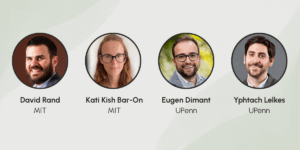Political polarization is becoming one of the most pressing challenges of our time, making it harder for people to compromise, engage in honest dialogue, or hold leaders accountable. A new study published in PNAS Nexus, “Unraveling Polarization: Insights into Individual and Collective Dynamics,” takes a deeper look at what’s driving this growing divide. The research was supported by an IHS grant and comes from scholars David G. Rand, Kati Kish Bar-On, Eugen Dimant, and Yphtach Lelkes.

Their focus is on affective polarization—a kind of distrust and emotional hostility between political partisans that goes beyond disagreement over issues. In the authors’ words, “Affective polarization threatens citizens’ willingness to compromise, interact, and hold their representatives accountable.”
“Affective polarization threatens citizens’ willingness to compromise, interact, and hold their representatives accountable.”
This matters because democracy depends on more than just elections—it relies on people being willing to live with disagreement, respect different perspectives, and build common ground. When political divisions deepen into personal animosity, the values of toleration and pluralism that are necessary for a thriving, open society begin to erode. Toleration allows individuals to express their views freely, while pluralism recognizes that diversity of perspectives strengthens communities and fosters positive social change. When political groups become increasingly distrustful of each other, these fundamental principles are at risk.
IHS has long supported research that explores how polarization shapes civic life—and how we might address it. All four authors of this new study have received IHS grants:
- David Rand was granted $26,410 in 2023 for a project aimed at mitigating polarization by fostering a shared factual reality—an essential component of a well-functioning democracy.
- Kati Kish Bar-On received a Humane Studies Fellowship to support her research on how intergroup tensions challenge trust, pluralism, and democracy.
- Eugen Dimant was awarded funding for a 2024 symposium exploring the roots and consequences of political polarization through political science, economics, and psychology.
- Yphtach Lelkes received $20,000 in 2023 to fund his Polarization Research Lab, which monitors partisan antipathy, antidemocratic behavior, and tolerance for political violence in the US.
By investing in this kind of research, IHS helps scholars uncover how polarization works and what might reduce it—now and for years to come.
By supporting IHS, you invest in scholars at a formative stage in their careers—not only with crucial financial support, but also with inspiration and connections to other like-minded and driven intellectual collaborators that they can’t find anywhere else.